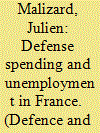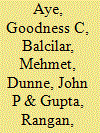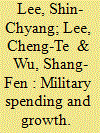| Srl | Item |
| 1 |
ID:
134029


|
|
|
|
|
| Publication |
2014.
|
| Summary/Abstract |
France has received little attention in the literature of defense economics, despite some outstanding features of the country's situation. This study attempts to partially fill this gap with new empirical evidence which evaluates the influence of military expenditure on the unemployment rate between 1975 and 2008. Our estimation is based on the ARDL approach to cointegration. The results reveal that both defense and non-defense spending exert a negative influence on unemployment but that defense spending has a higher negative impact.
|
|
|
|
|
|
|
|
|
|
|
|
|
|
|
|
| 2 |
ID:
134028


|
|
|
|
|
| Publication |
2014.
|
| Summary/Abstract |
This paper contributes to the growing literature on the milex-growth nexus, by providing a case study of South Africa and considering the possibility of structural breaks by applying newly developed econometric methods. Using full sample bootstrap Granger non-causality tests, no Granger causal link is found between military expenditure and GDP for 1951-2010, but parameter instability tests show the estimated VARs to be unstable. Using a bootstrap rolling window estimation procedure, however, finds evidence of bidirectional Granger causality in various subsamples. This implies standard Granger non-causality tests, which neither account for structural breaks nor time variation may be invalid.
|
|
|
|
|
|
|
|
|
|
|
|
|
|
|
|
| 3 |
ID:
143602


|
|
|
|
|
| Summary/Abstract |
The paper analyzes the effects of military spending on economic growth in a small open stochastic endogenous growth model involving the supply-side and demand-side effects produced by military spending. We show that a rise in the military spending affects economic growth through four channels, including the crowding-out effect, the spin-off effect, the resource mobilization effect, and the portfolio effect. The net effect which depends on these four channels is ambiguous. Hence, we demonstrate that there exists an optimal defense burden that maximizes the economic growth rate.
|
|
|
|
|
|
|
|
|
|
|
|
|
|
|
|